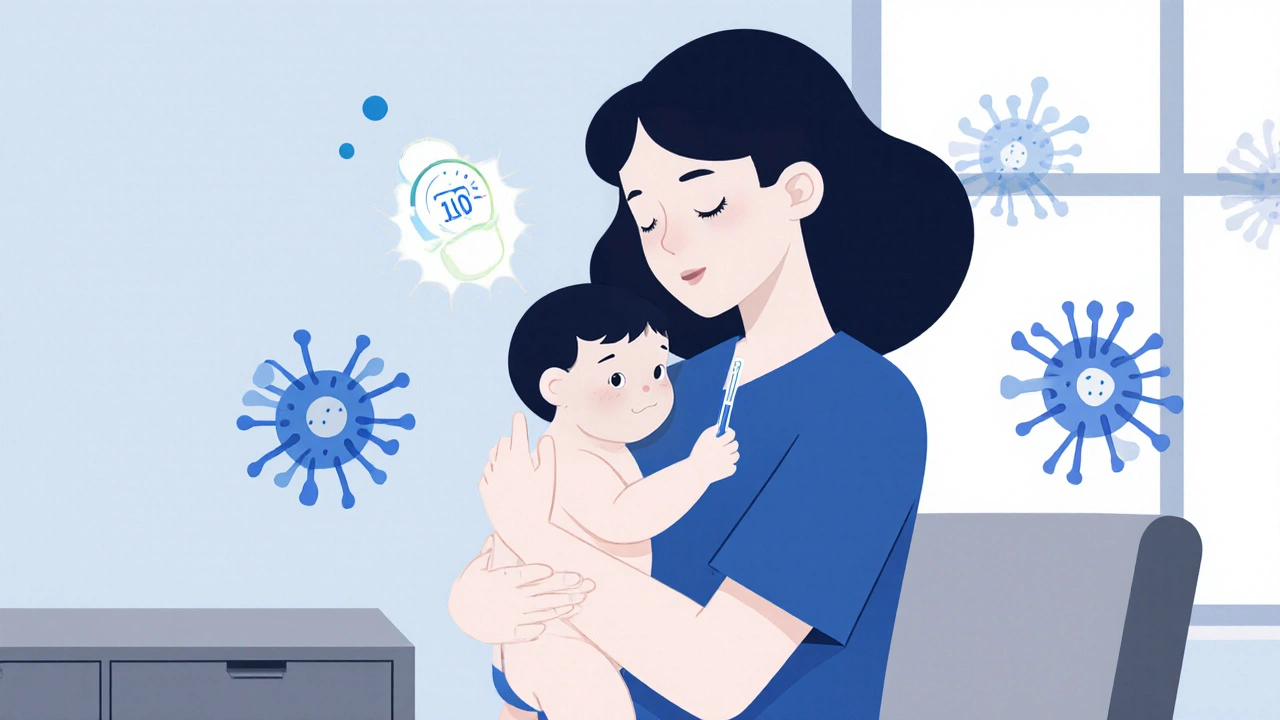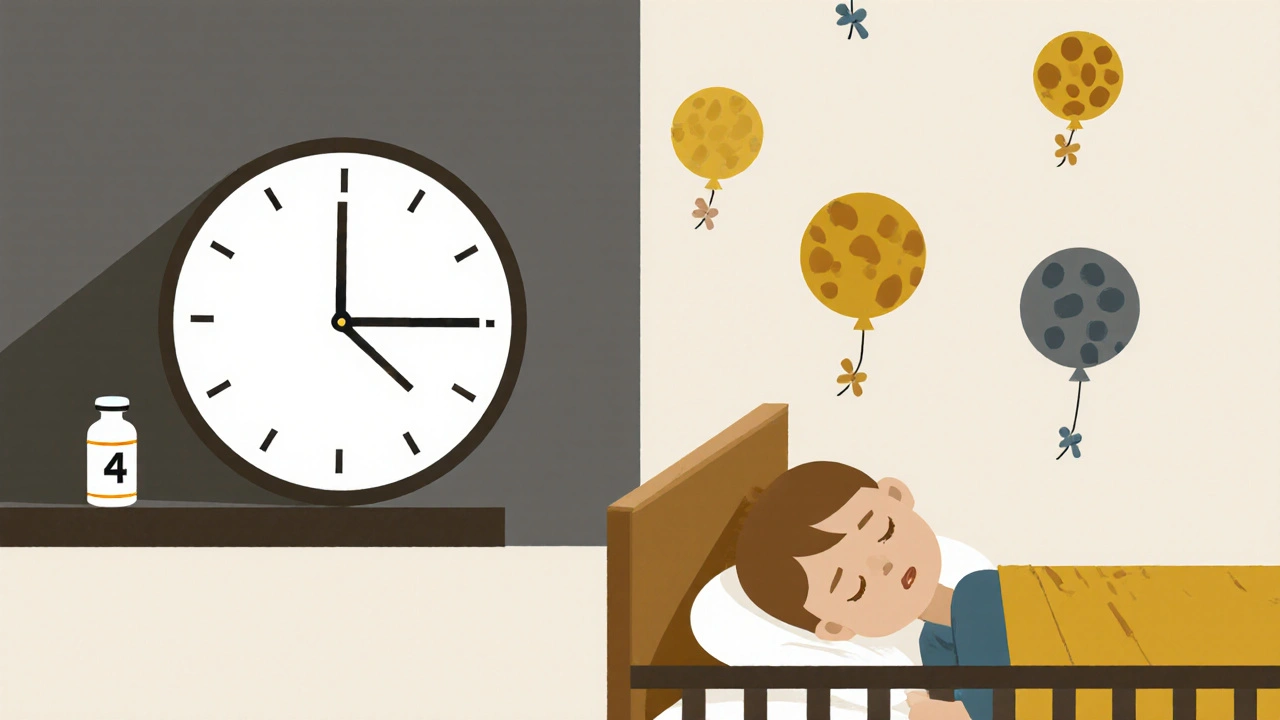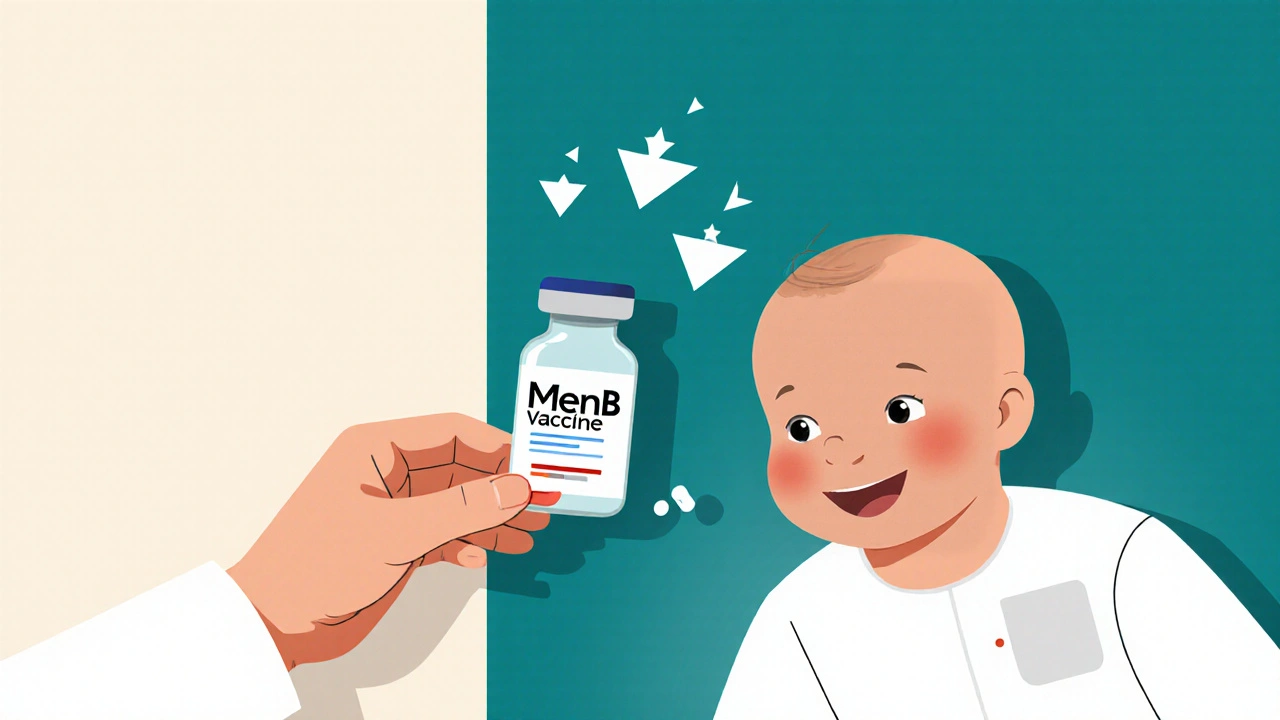When to Give Fever Reducers After Your Child's Vaccines
 Nov, 16 2025
Nov, 16 2025
It’s normal to worry when your baby gets a fever after a vaccine. You want to help them feel better-fast. But giving fever reducers too soon might actually weaken how well the vaccine works. This isn’t just a theory. Multiple studies show that giving acetaminophen or ibuprofen before or right after vaccination can lower antibody levels, which are the body’s way of building long-term protection.
Why Timing Matters More Than You Think
Back in the early 2000s, doctors often told parents to give fever reducers before the vaccine to prevent discomfort. That changed after a 2009 study in The Lancet found that kids who got acetaminophen before their shots had lower antibody responses to several vaccine components. Since then, research from the Children’s Hospital of Philadelphia, the CDC, and the American Academy of Pediatrics has confirmed it: preemptive fever meds can blunt the immune response.
It’s not that the vaccine stops working entirely. Most kids still develop enough antibodies to be protected. But the difference matters-especially for vaccines that rely on strong, long-lasting immunity, like pneumococcal or DTaP. Studies show antibody levels dropped by up to 20% in kids given prophylactic fever reducers. That’s not a huge number, but in medicine, even small drops can affect how well protection lasts over time.
Which Vaccines Are Most Likely to Cause Fever?
Not all vaccines cause fever the same way. Some are more likely to trigger a rise in temperature than others. Here’s what you’re likely to see:
- Prevnar 13 (pneumococcal): 24-35 out of 100 babies develop a fever within a week.
- Pediarix (DTaP-IPV-HepB combo): 28-39 out of 100 babies get a fever within 4 days.
- MenB (meningococcal B): This one causes fever in over half of infants-so much so that the UK’s NHS recommends giving paracetamol after this vaccine at 8 and 16 weeks.
Fever usually shows up within 12 hours of the shot and lasts 1-2 days. It rarely goes above 102°F (39°C). Most of the time, it’s mild and goes away on its own.
When Should You Give Fever Medicine?
Don’t give fever reducers right after the shot unless your child is clearly uncomfortable or has a high fever. The best practice? Wait at least 4 hours.
Why 4 hours? Research from a 2016 Polish study found that giving acetaminophen or ibuprofen more than 4 hours after vaccination didn’t reduce antibody levels. But if you gave it right away-especially in three doses over 24 hours-immunity dropped. That’s why experts agree: wait and see.
Here’s when to act:
- Below 100°F (37.8°C): No medicine needed. This is a normal immune response.
- 100-102°F (37.8-39°C): Monitor, hydrate, dress lightly. Medicine isn’t necessary and may interfere with immunity.
- Above 102°F (39°C): It’s okay to give acetaminophen or ibuprofen. This is the threshold where discomfort outweighs the small risk to immunity.
Seattle Children’s Hospital and the CDC both warn against treating low-grade fevers with medication. Your child’s body is doing exactly what it’s supposed to do-fighting the vaccine’s harmless components to build immunity. Fever is part of the process.

Medication Dosing: What’s Safe?
Never guess the dose. Weight matters more than age. Here’s what works for most infants:
- Acetaminophen (Tylenol): For babies 6-11 months (18-23 lbs), give 1.25 mL of infant drops (160 mg/mL). Repeat every 4-6 hours. Max 4 doses in 24 hours.
- Ibuprofen (Advil, Motrin): Same age group: 2.5 mL of infant drops (50 mg/mL). Repeat every 6-8 hours. Max 4 doses in 24 hours.
Important rules:
- Don’t give acetaminophen to babies under 12 weeks old. Their liver isn’t mature enough to handle it safely. Call your doctor if they have a fever in the first 3 months.
- Don’t give ibuprofen to babies under 6 months. Most guidelines say wait until 6 months, though some doctors may allow it earlier in specific cases.
- Never give aspirin. It’s linked to Reye’s syndrome-a rare but deadly illness in children.
The One Big Exception: MenB Vaccine
The UK’s NHS is the only major health body that recommends giving paracetamol right after the MenB vaccine-at 8 weeks and 16 weeks. Why? Because this vaccine causes fever in up to 60% of babies, and high fevers can lead to febrile seizures in vulnerable infants.
Their guidance is specific: give 3 doses of liquid paracetamol (2.5 mL) after the shot, spaced 4-6 hours apart. This isn’t prophylactic in the traditional sense-it’s targeted prevention for a high-risk vaccine. In the U.S., most pediatricians don’t follow this unless the child has a history of febrile seizures.
So if your child is getting MenB and you’re in the U.S., ask your doctor. Some will recommend it. Others won’t. Either way, don’t give it before the shot. Always wait until after.
What About Other Symptoms?
Fever isn’t the only thing you might see. Redness, swelling, or soreness at the injection site is normal. So is fussiness or sleepiness. These usually fade within 24-48 hours.
Here’s what to do:
- Offer extra fluids-breast milk, formula, or water if they’re older than 6 months.
- Dress them in light clothing. Don’t bundle them up.
- Use a lukewarm sponge bath if they’re uncomfortable. No ice baths or alcohol rubs.
- Hold and comfort them. Sometimes, closeness is the best medicine.

Can You Still Vaccinate If Your Child Has a Fever?
Yes. If your child has a low-grade fever (under 101°F) from a cold or another mild illness, it’s still safe to vaccinate. The CDC says mild illness doesn’t affect how well the vaccine works. In fact, delaying vaccines can leave your child unprotected longer.
Only hold off if they’re very sick-high fever, vomiting, trouble breathing, or lethargic. That’s when you should call your doctor before the appointment.
What If You Already Gave Medicine Before the Shot?
Don’t panic. One dose of acetaminophen or ibuprofen before vaccination won’t ruin the vaccine. The risk comes from repeated, scheduled doses over 24 hours. If you gave one dose out of worry, your child is still likely protected.
But going forward, wait at least 4 hours after the shot before giving any fever reducer. Use it only if needed. This gives their immune system the best chance to respond fully.
Final Takeaway: Less Is More
The goal isn’t to eliminate every symptom. It’s to support your child’s natural immune response while keeping them comfortable. Fever reducers are helpful tools-but they’re not always necessary.
Trust your instincts, but let the science guide your timing. Wait 4 hours. Watch for signs of real discomfort. Only medicate when the fever hits 102°F or higher. And remember: a mild fever after a vaccine isn’t a problem-it’s proof your child’s body is learning how to fight off real infections in the future.
When in doubt, call your pediatrician. But don’t rush to the medicine cabinet. Sometimes, the best thing you can do is wait-and watch.
Can I give my baby fever medicine before their vaccines?
No. Giving fever reducers like acetaminophen or ibuprofen before vaccination can reduce the immune response to the vaccine. Studies show lower antibody levels in children who received these medications before shots. It’s best to wait until after the vaccine and only give medicine if your child develops a fever above 102°F or seems very uncomfortable.
How long after a vaccine should I wait before giving fever medicine?
Wait at least 4 hours after the vaccine before giving any fever reducer. Research shows that giving medication more than 4 hours after vaccination doesn’t interfere with immune response. If you give it earlier-especially in multiple doses over 24 hours-it can lower antibody levels. If your child is fine for the first few hours, you likely won’t need medicine at all.
Is it safe to give ibuprofen after vaccines?
Yes, but only if your child is at least 6 months old. Ibuprofen (Advil, Motrin) is safe and effective for reducing fever and pain after vaccines, as long as you wait at least 4 hours and use the correct weight-based dose. Do not give it to babies under 6 months unless directed by a doctor. Acetaminophen is preferred for younger infants, but not under 12 weeks.
My child has a low fever after the shot-should I treat it?
No, not unless they’re clearly uncomfortable. Fevers between 100°F and 102°F are normal after vaccines and help the immune system build protection. Giving medicine at this level may actually reduce how well the vaccine works. Focus on keeping your child hydrated, lightly dressed, and calm. Only use fever reducers if the temperature goes above 102°F.
What if my baby is under 12 weeks and has a fever after a vaccine?
Call your doctor right away. Babies under 12 weeks have immature immune systems, and even a low fever can signal a serious infection. Do not give acetaminophen or any other fever reducer without medical advice. Seek care immediately-this is a medical red flag in newborns.
Does the MenB vaccine need special treatment with fever medicine?
In the UK, the NHS recommends giving liquid paracetamol after the MenB vaccine at 8 and 16 weeks to reduce the risk of high fever and seizures. In the U.S., most pediatricians don’t routinely do this unless the child has had febrile seizures before. If you’re unsure, ask your doctor. But never give it before the shot-only after, and only if recommended.
Can I give fever medicine if my child already had a fever before the vaccine?
Yes. If your child has a mild fever (under 101°F) from a cold or other minor illness, it’s still safe to vaccinate. The CDC confirms that mild illness doesn’t affect vaccine effectiveness. You can give fever medicine as needed for comfort, but avoid giving extra doses right before the appointment unless your doctor says so. The key is to treat the symptom, not to prevent the vaccine’s natural reaction.

Gordon Mcdonough
November 17, 2025 AT 19:26Wow so now I’m supposed to watch my baby suffer for 4 hours just so some lab rats can get better antibody numbers? My kid ain’t a test subject. I gave Tylenol at 2 hours and he slept through the night. Who cares if his antibodies are 20% lower? He’s not dead. That’s the win.
Jessica Healey
November 17, 2025 AT 21:56my 8 month old got the menb shot last week and i gave paracetamol right after like the nurse said and he was fine. i read this article and was like ohhh so i did it right?? i was so scared i’d mess up. thanks for the clarity!!
henry mariono
November 19, 2025 AT 11:44I appreciate the nuance here. It’s easy to panic when your baby is hot and fussy. But the idea of letting the immune system do its job without interference… it makes sense. I’ve been waiting 4-6 hours now and it’s worked fine. No meds unless the fever hits 102.5. Calm is contagious.
Sridhar Suvarna
November 19, 2025 AT 19:29As a parent from India where vaccines are often given in crowded clinics with no follow-up, this is vital information. Many here give fever medicine immediately out of fear. But science says wait. Let the body respond. I shared this with my sister-in-law. She’s been giving ibuprofen before every shot. Now she’s changing.
Joseph Peel
November 21, 2025 AT 10:32It’s fascinating how medical advice evolves. In the 90s, we were told to pre-medicate. Now we’re told not to. The science is clear: immune response is a biological process, not a symptom to be suppressed. Respect the process. Trust the data. Don’t confuse comfort with cure.
Kelsey Robertson
November 23, 2025 AT 01:27Of course the CDC says not to give meds-because they’re funded by Big Pharma! Who do you think profits from vaccines? And who profits from parents panicking and buying Tylenol? The 20% drop in antibodies? That’s a marketing stat. My cousin’s kid got the shot, got a 104 fever, and still got chickenpox last year. Coincidence? I think not.
Joseph Townsend
November 24, 2025 AT 20:36Let me tell you something-my baby turned into a screaming gremlin after the DTaP. I gave Motrin at 3 hours. He stopped crying. He smiled. He ate. I didn’t care about antibody levels-I cared about my child not screaming like he was being tortured. Science can kiss my ass if it means watching my kid suffer. I’m not a lab rat. I’m a mom.
Bill Machi
November 26, 2025 AT 09:34Let’s be real. Most parents don’t read studies. They read blog posts. And this one? It’s the most balanced thing I’ve seen. But here’s the problem: pediatricians still hand out Tylenol packets at the clinic. That’s institutional inertia. You need to be your own advocate. Don’t take the packet. Say no. Wait. Observe. That’s the real win.
Elia DOnald Maluleke
November 27, 2025 AT 07:00In South Africa, we do not have the luxury of overthinking fever. We give medicine because we fear the unknown. But this article-this is wisdom. It does not scream. It does not panic. It speaks. And in speaking, it heals. I will share this with my clinic. Not because it is perfect-but because it is honest.
satya pradeep
November 28, 2025 AT 18:38bro i gave tylenol after menb shot and my kid was fine. but i waited 5 hours. i was scared but i trusted the doc. now i know why. also, 102 is the line? i thought it was 101.5. thanks for clarifying. saved my sanity.
Prem Hungry
November 28, 2025 AT 23:07Dear parents, please do not rush to medicine. Your child’s body is not broken-it is building. A mild fever is not an enemy. It is a teacher. Wait. Observe. Offer water. Hold them close. Sometimes, love is the only medicine they need. You are doing better than you think.
Leslie Douglas-Churchwell
November 29, 2025 AT 21:09THEY DON’T WANT YOU TO KNOW THIS. The 20% antibody drop? That’s the exact threshold they engineered to make boosters necessary. Think about it-why else would they push this ‘wait 4 hours’ nonsense? It’s not about immunity. It’s about recurring revenue. Vaccines are a subscription model. Wake up.
shubham seth
November 30, 2025 AT 05:34Let’s cut the BS. You gave Tylenol before the shot? Congrats. You just turned your kid into a walking placebo. Antibodies are not magic. They’re biology. And biology doesn’t care about your anxiety. You wanted comfort? You got it. You wanted protection? Maybe. Maybe not. But now you know. And knowledge? It’s not always comforting. But it’s real.